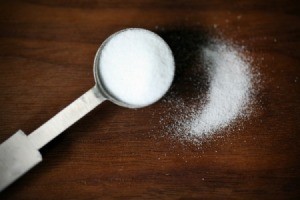 Being from Australia we have different terms for some products. Please can you tell me if baking soda is bi-carbonate of soda, or is it what we call baking powder, which is used when we want plain flour (no rising in it) to rise? Do you have self-raising flour too, which is flour that needs no raising agent, since it is included in the flour? I get really muddled up at times. Thank you.
Being from Australia we have different terms for some products. Please can you tell me if baking soda is bi-carbonate of soda, or is it what we call baking powder, which is used when we want plain flour (no rising in it) to rise? Do you have self-raising flour too, which is flour that needs no raising agent, since it is included in the flour? I get really muddled up at times. Thank you.
Yes, baking soda is sodium bicarbonate. Also, we do have self rising flour here in the U.S. You can also purchase all-purpose flour and add baking powder.
Yes, we have self-rising flour but I think (may be wrong) that most bakers use plain flour and add things to make baked goods rise. At least I do.
My box says that Baking Soda is Sodium Bicarbonate. Baking Powder is corn starch, bicarbonate of soda, and several other things.
Self-rising flour is plain flour with baking POWDER and salt. Thanks.
Here are the questions asked by community members. Read on to see the answers provided by the ThriftyFun community.
What is the difference between baking powder and baking soda?
Thanks heaps.
By Lorraine from Perth, Western Australia
Both baking soda and baking powder are leavening agents, which means they are added to baked goods before cooking to produce carbon dioxide and cause them to 'rise'. Baking powder contains baking soda, but the two substances are used under different conditions.
Baking Soda
Baking soda is pure sodium bicarbonate. When baking soda is combined with moisture and an acidic ingredient (e.g., yogurt, chocolate, buttermilk, honey), the resulting chemical reaction produces bubbles of carbon dioxide that expand under oven temperatures, causing baked goods to rise. The reaction begins immediately upon mixing the ingredients, so you need to bake recipes which call for baking soda immediately, or else they will fall flat!
Baking Powder
Baking powder contains sodium bicarbonate, but it includes the acidifying agent already (cream of tartar), and also a drying agent (usually starch). Baking powder is available as single-acting baking powder and as double-acting baking powder. Single-acting powders are activated by moisture, so you must bake recipes which include this product immediately after mixing. Double-acting powders react in two phases and can stand for a while before baking. With double-acting powder, some gas is released at room temperature when the powder is added to dough, but the majority of the gas is released after the temperature of the dough increases in the oven.